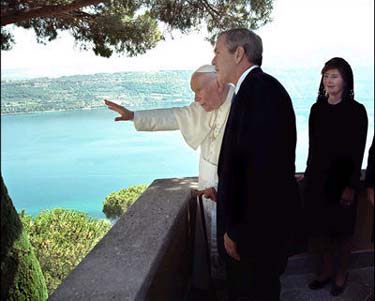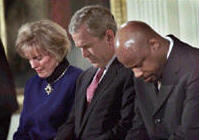 |


|
|
for Bush's Faith-Based Initiative |
|
By Bill Berkowitz
The accusations by the Washington, DC-based church-state watchdog group came on the heels of the publication of "Rolling the Dice", a Marvin Olasky-penned, early-August cover story in World magazine. In a lengthy story, Olasky reveals the thinking and political machinations behind the Bush Administration's faith-based campaign. Olasky, the editor of ^World~, a popular weekly evangelical magazine, provides previously unknown details about the strategizing behind the initiative. Ironically, the first casualty of the "faith-based wars" is John DiIulio, the man who's been walking an ideological tightrope as director of the White House Office of Faith-Based and Community Initiatives. For DiIulio, it's been one battle after another since he accepted the president's appointment seven months ago. After much pressure from religious conservatives, DiIulio handed in his resignation in mid-August and at the press conference announcing his decision, he appeared anxious to move on. However, even in midst of turmoil, DiIulio stuck to the script, saying "My goal was not to see it [Bush's faith-based initiative] pass the Senate. My goal was to see it pass the House." Which it did by a 233 to 138 vote in late July. Background:
John DiIulio was named to head up the White House Office on Faith-based and Community Initiatives, an appointment, Olasky claims, geared towards bringing liberals on board -- DiIulio is a Democrat who voted for Al Gore. Too bad if conservatives were dismayed by the choice. After all, this was one element of Bush's triangulation strategy. "Republican triangulation worked" early on as the initiative received generally favorable press. Then DiIulio angered religious conservatives during a speech at the National Association of Evangelical Convention. In April, with opposition mounting from the right, DiIulio was convinced to reverse his position that "preaching, teaching, or evangelism" disqualified an organization from receiving federal grants. By June, many conservatives and Christian organizations were on board. The Traditional Values Coalition's Lou Sheldon summed it up saying, "History will say it's more significant that we were at the table than what we got." Liberal changes to H.R. 7 rendered it "a complete loser" that "would destroy our programs" said Heather Humphries of the National Center for Neighborhood Enterprise. Star Parker, president of the Coalition on Urban Renewal and Education "fought the requirement to segment religious activities from others." Parker said "you can't gut proselytizing from religious-run programs and expect them to work."
 Mr. Bush and Pope John Paul II during Mr. Bush's trip to the Vatican earlier this year
Mr. Bush and Pope John Paul II during Mr. Bush's trip to the Vatican earlier this year
Olasky writes that he was assured from the very beginning that Department of Justice senior counsel Carl Esbeck who was "a master at writing vague language," would create an opening for proselytizing despite what appears to be restrictions against it. Folded into the House bill is a "stealth provision" using a system of vouchers to allow faith-based organizations get around the no proselytizing restrictions. In an article posted on the Web site of the newly founded Center for the Study of Compassionate Conservatism, Michael Barkey describes vouchers as the "Faith-Based Initiative's saving grace": "Like food stamps, vouchers can be issued directly to individuals who may then redeem them for goods and services at the qualifying institution of their choice. Vouchers maintain a wall of separation between the government and the service provider, reducing the likelihood of organizational dependency or regulatory creep… And the government doesn't support any particular religion through a voucher plan, only enable individuals to choose where to go for assistance." Barkey says the bill allows cabinet secretaries "to convert 'some or all of the funds' earmarked for social service spending under the charitable choice provision of the 1996 welfare reform law ($47 billion annually), into 'indirect assistance,' that is into vouchers." Richard Land, president of the Ethics and Religious Liberty Commission of the Southern Baptist Convention, who earlier this year said he wouldn't touch faith-based money "with the proverbial ten-foot pole," now called "voucherization," the "magic wand that deals with almost all the thorny church-state problems." A setback to the entire process came in the form of the Washington Post's revelations of back room dealings between the Salvation Army and the White House, aimed at circumventing state and local laws banning discrimination on the basis of sexual orientation. Some in Congress began crafting an amendment to H.R. 7 to force religious organizations who received government money to comply with existing state and local anti-discrimination statutes. This would have the deal-breaker, but Speaker Denny Hastert convinced House members to pass these thorny issues on to the Senate. Olasky writes: "The biggest feint of all, according to one executive close to the White House, has been the entire debate over separating 'religious' and 'nonreligious' content [of the recipient agency's programs]. 'Let people fight over that. It's all a show,' he said. 'We kick and scream. We didn't roll over too easy on language, or else they'll think it's what you wanted.' What's truly important in the legislation, he said, is a 'stealth provision' about vouchers: 'Let people argue over grants, but get the vouchers passed.'" Many conservatives believe that the Senate will alter the bill beyond recognition. Ken Connor, head of the Washington, DC-based Family Research Council, compared it to Bush's education bill, which is still winding its way through Congress. "By the time it mutated through its various iterations, it was something we could not support," he said. "I suspect that by the time the Senate gets through with it, conservatives will have the same revulsion for the bill that they had for the education bill." Jerry Falwell has urged Bush to take his time choosing DiIulio's successor. At a speech in Garland, Texas, Falwell said the new director should be someone who knows the faith community and can work closely with it. As this point, no matter who is chosen to head up the White House Office, Bush's faith-based initiative faces an unpredictable future. Bill Berkowitz is an Oakland-based free lance writer covering the Religious Right and related conservative movements. Contact him at wkbbronx@aol.com. |

© 1997-2002 BEI
 A pious Mr. Bush looks to bring religion to the lives of Americans through federal dollars
A pious Mr. Bush looks to bring religion to the lives of Americans through federal dollars